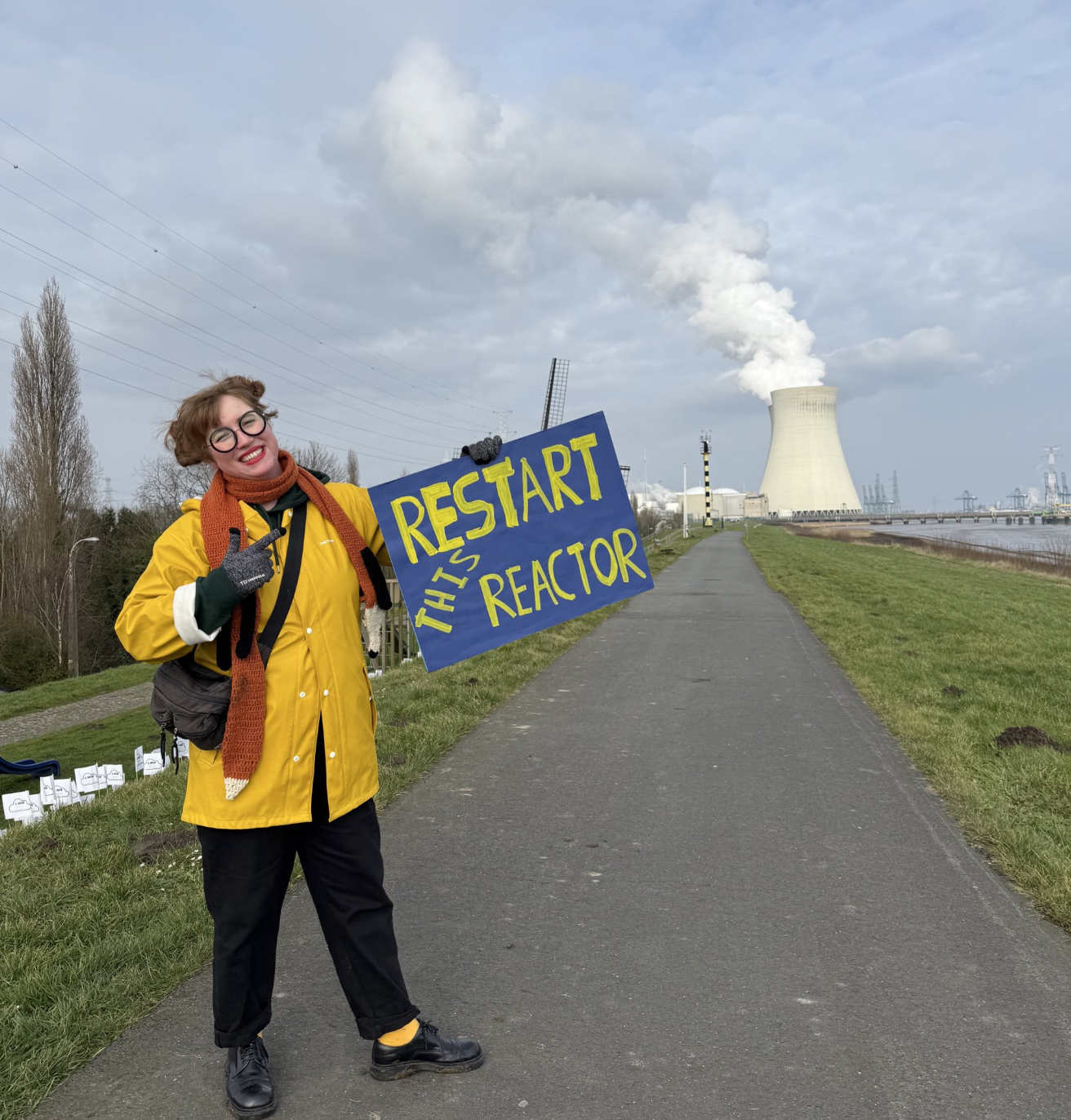Astrid Morris, Mum for Nuclear, Nuclear Communications Specialist, Advocate, September ‘25
Meet the ‘chronically online’ nuclear communications mum
For Astrid Morris, having children was an existential, environmental awakening. Morris was deeply concerned about climate change and biodiversity loss, and wanted to provide a better future for her children. As individual lifestyle changes seemed futile in making large-scale change, Morris shifted to nuclear advocacy, joining the UK group Mums for Nuclear.
“It wasn't really until I was pregnant in 2019 (that I started considering nuclear). This was the year that was a big there was a big climate push to say that we have 12 years left to change the course of history,” Morris said. “The climate communications in my vulnerable state were really impactful. I had a lot of thoughts about longevity, and I really thought about what I wanted to spend my time on, and that made me look into nuclear.”
Morris invested lots of time into evaluating eco–friendly consumer choices, like disposable versus washable diapers, with the energy to wash and compost the methane, recognizing that it was both a privilege and a struggle. Doing what she could, Morris composted more diligently, bought a wooden toothbrush, and ate a lot of vegan substitute foods. Morris said climate solutions cannot rely on 7 to 8 billion people to make decisions like this, and that she became a large supporter of fundamental institutional change.
While she grew up in Aarhus, Denmark, Morris is a globetrotter and has called California, Australia, and France her home over the years. The fight for Diablo Canyon in California galvanized Morris into nuclear advocacy and work in communications. Starting in July 2019, Morris headed Communications Strategy at Generation Atomic. In 2022, Morris became the Digital Communications Manager for Sizewell C, a proposed nuclear plant in the UK, before joining her current role in Strategic Communication at Helixos, a consultancy that works with clients in cleantech commercialization.
At Helixos, Morris produces newsletters, websites for clients, and strategic thinking. As she put it, Morris is “chronically online,” thinking outside of nuclear and looking for opportunities in terms of how people are acting, what culture exists in different spaces and platforms, and how nuclear can cater to what people want to know in the attention economy.
“I am really happy that some of my clients have recently been really more receptive to short-form video. Short form video, I think, is the future,” Morris said. “It's the platform you want to be on. I think, in an era of AI, that authenticity is at a premium. And talking to people face, like being in people's worlds, talking to them directly with your voice, your own face, that's the kind of strategic impact that I'm trying to advocate for.”
Astrid at Belgium Stand Up for Nuclear Event
Morris, sporting a Mother’s for Nuclear t-shirt during a pregnancy.
As far as the communications and public opinion battle, Sizewell C was an interesting case, Morris said, because a nuclear plant already exists on the site. Despite this, which she said should make it a “slam dunk” and an easy path, 10 years of consultations have ensued due to public opposition. Morris focused on the income stream the plant would bring, and how it could become an energy hub for the entire region. Additionally, Sizewell C has conducted excellent ecological management, according to Morris, and there will be an incredible nature reserve around the plant, a point emphasized in the communications campaign.
Morris sees communications and public opinion as crucial to the success of the nuclear industry, but recognizes there are additional obstacles as well, including NIMBYism, financing, and lawsuits.
“I used to think it was all public opinion. In which case, the only thing holding nuclear back is public opinion; communications is everything, right? Now I feel there’s a bit more nuance to it,” Morris said. “There’s a lot about cost, there’s a lot about your institutional country model, if you’re a democratic nation that cares what people think or not.”
Building community has always been a part of Morris’s advocacy work. When she was living in London, helping form Mums for Nuclear, she set up nuclear drink events at a local brewery, where anyone interested in nuclear could meet up and interact with the public. Additionally, Morris organized multiple tours of the nuclear waste at Sizewell B, pushing for activists to kiss the waste years before nuclear influencers like Isabelle Boemeke made such kisses famous on Twitter.
It was through Twitter that Morris saw leftist women like herself pushing for nuclear as a way to decarbonize the grid in record time. Inspired, Morris began researching the modern safety measures and risk management of nuclear plants, and became convinced that nuclear was the path that “could save us.”
“I think it is the only thing that can save us. I think it's a hard thing to advocate for. If there was a different way, I think I would be on that camp,” Morris said.
Astrid speaking at the IAEA Stakeholder Conference
Shifts in public opinion over the last 7 years make Morris optimistic about the future of nuclear energy on a global scale. Morris attended COP 26 in Glasgow, where the tone towards nuclear was generally negative and dismissive as a viable clean energy source. Nuclear energy broke out with significant support and pledges from multiple nations to expand nuclear at COP 28.
Still, Morris said the scale of the problem is daunting. Current efforts are relatively slow, in her opinion. Fossil fuels still supply around 80% of the world’s energy, and in the U.S., fossil fuels provide 60% of electricity.
“I'm fearful, because I spend so much of my day, so much of my working life, and waking life, looking at the scale of the problem very intimately. It's hard not to feel pessimistic about the rate of change,” Morris said. “You look at that big chunk, that big fossil fuel chunk. We need something to really make a dent. We need something not just to skim off the top.”
Morris’s native Denmark generates 57% of its electricity with wind energy, and a little over 10% with fossil fuels, painting a picture that appears to be a very clean grid. The country also relied on, in 2023, 16.3% of biofuels to meet electricity, an energy source classified as renewable, but that Morris abhors. Morris is offended that advanced societies, with the capability of harnessing the power of the universe, would cut down trees for energy production. While Denmark banned nuclear energy in 1985, this year the Danish government began reconsidering nuclear energy, analyzing the benefits of new nuclear generation.
Morris holds hope for the approval of several advanced reactor designs under development, which she thinks can make a major difference in deployment.
“I'm waiting with bated breath for all these more advanced reactors to go through approval. I'm not saying that the big reactors can't do the thing,” Morris said. “But the kind of world I'm envisioning in which we actually make a dent in fossil fuel use is a world where you can quickly set up and quickly supply your factory with a nuclear reactor. So that's the future I'm working towards.”
Morris posing next to nuclear waste dry storage.
A large part of what drives Morris is her sense of responsibility towards her children. Morris said she wants to be able to look her kids in the eyes when they are older, and honestly tell them that she actively worked to combat climate change.
Her desire to provide a better future for her children led Morris to join Mothers for Nuclear. Morris described Mothers for Nuclear as a compelling and authentic organization that resonates due to the concern mothers have for their children. By telling honest, personal stories, the organization captures public attention and highlights how supporting nuclear energy is a legitimate and powerful way for parents, especially mothers, to act on climate, ensuring a liveable world for the next generation.
“Learning about nuclear power gave me hope. I now know what it is that we need to fight for, to save the world for our child,” Morris said. “It’s nuclear. I just hope we can do it fast enough.”





